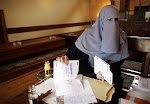 Erick Stakelbeck
Erick StakelbeckIt has been nearly 20 years since Somalia
last had a functioning government. Islamic Jihadists now control most of the country – and sharia is the law of the land. Tens of thousands of Somali refugees have resettled in America in recent years to escape the chaos of their homeland, which is located in the Horn of Africa.
But the transition isn't going smoothly in one small town
.
At first glance, Shelbyville is your typical sleepy southern hamlet. It's nestled in middle Tennessee, where the walking horse is king.
There's Main St., the local sheriff, a movie theatre. It's all very "Mayberry," except for one big difference: the recent arrival of hundreds of Somali Muslims.
Small Town Having Difficulties
Shelbyville is about an hour's drive from Nashville, in the heart of the Bible Belt. Like many Americans, the citizens of Shelbyville knew little about Somalia other than the 1993 Black Hawk Down incident, in which 18 U.S. servicemen were killed while battling warlords and Islamic Jihadists in the Somali capital of Mogadishu.
So when hundreds of Somalis began turning up in the town – many of them dressed in traditional Islamic garb – locals quickly took notice.
"They've had an impact here. Unfortunately, it's not been a good impact," said Brian Mosely, a reporter for the local Shelbyville Times-Gazette.
Mosely won an award from the Associated Press for a series of articles he wrote for the paper about Shelbyville's Somalis.
"I found that there was just an enormous culture clash going on here," he said. "The Somalis were – according to a lot of the people I talked to here – were being very, very rude, inconsiderate, very demanding. They would go into stores and haggle over prices. They would also demand to see a male salesperson, would not deal with women in stores"
Different People, Different Culture
"Their culture is totally alien to anything the residents are used to," Mosely added.
The problems extend to local schools – where some Somali students won't talk to female administrators. There have also been issues with local law enforcement.
"I'm not really sure whether that is because of experiences with the police in their country, or whether that's just the way their culture is," said Shelbyville's Police Chief, Austin Swing.
Shelbyville is home to about 17,000 people. The town's Somali population is estimated to be between 400 and 1,000.
Mosely says the Somalis have isolated themselves from the rest of the community.
"We're talking about people who have not had any experience with Western civilization," he explained. "They don't know the language. Things like running water are a miracle to some of these folks…you don't take people from a totally alien culture, put them into a community, and then say 'alright, you must get along.'”
Little Chance to Adapt
Abdirizak Hassan is the director of the Somali Community Center in nearby Nashville. He says the state of Tennessee has no programs to help immigrants integrate into their new surroundings.
"They come, and the only thing they can do is go to work, and then after work they go back to the apartment," Hassan said. "They're totally isolated and there's no interaction between them and the locals."
He added that some have even expressed a desire to return to Somalia.
"A lot of them face eviction. They put them in an apartment complex that costs $600 a month. They can't get a job that gives them that much money," Hassan explained.
"And sometimes you have families, like, a single mother with eight kids, or seven kids or six kids, and you expect her to go to work in six months time with no English, no driver's skills, nothing? I mean, sometimes it's impossible."
"The locals, mostly, when they see a few hundred people in their backyard with a different look, strangers, you know, of course they have the right to be concerned," he added. "But I think if the local authorities and organizations like ours do a lot of outreach, I think we can bridge the gap."
So how did so many Somalis end up in rural Shelbyville? The answer can be complicated.
Taken in by the U.S.
The State Department helps resettle refugees from war-torn countries like Somalia in the United States. The resettlement project is one part of a taxpayer-funded refugee aid program with a billion dollar budget.
Immigrants are chosen from UN refugee camps. The selected refugees then undergo a few days of cultural orientation and are soon on their way to America.
Although most of the refuges are repatriated to their home countries, the U.S. takes in more refugees than any other nation – with a cap of about 80,000 this year.
"What we do is we look at the most vulnerable groups of refugees," said Todd Pierce of the State Department's Bureau of Population, Refugees and Migration. "One group we've tried to help is Iraqi Christians and those who've worked with U.S. and Coalition forces."
Pierce said the resettlement program helps improve America's image in the eyes of the world.
"It's one of the best facets of America, that we are a very generous, hospitable country," he said. "This is something that has been bipartisan for decades now – we've brought people in….we look at Africa, we look at the Middle East, we look at Southeast Asia."
A Rocky Transition?
More than 150,000 Somalis now live in the U.S., most in larger cities like Minneapolis, Nashville, Boston, Seattle and Columbus, Ohio.
Gang activity has been a major concern. And according to the U.S. government, at least a dozen young Somali Americans have returned home in recent months to join an al-Qaeda-linked terrorist group called al-Shabab.
As a result, the FBI is conducting investigations in several cities with large Somali populations. The fear is that the Somalis will return to America and put their terror training to use on U.S. soil.
Pierce says the government tries to shut any potential troublemakers out of the refugee resettlement program.
"We work closely with the Department of Homeland Security to make sure we vet people coming here, especially since 9/11. It's very important," he said.
Motivated by Jobs
"Our experience has been that refugees are very successful at resettling," said Holly Johnson of the Tennessee Office of Refugees.
Johnson said the federal government contracts with social welfare groups at the local level to help set the refugees up in apartments, find them jobs and ease their transition to America.
"They are completely self sufficient, usually within four months," she said. "They arrive here with nothing but a duffel bag of clothes, and they're on their own, paying their bills, children are attending school, they know where their doctor's office is within a few months."
After a few months in their settlement cities, the refugees are free to move around the country and live wherever they please.
Enter Shelbyville
Somalis in other cities were drawn to Shelbyville by the jobs offered at the local Tyson chicken processing plant.
The plant came under fire from the Department of Justice in 2001 for hiring illegal Hispanic immigrants.
The large influx of Somalis has only added to locals' frustration with the plant and the government.
"We've had three major industries shut down here and 700 to 800 people have lost their jobs," Mosely said. "They're trying to find anything they can, and then – as they see it –the government is shipping people from overseas to come here and take their jobs."
Getting Past Controversy
Despite locals' continued complaints over its hiring practices, Tyson says it is doing things by the book. A Tyson spokesman said the company is following federal employment guidelines – and that the majority of its employees are local residents.
The Tyson plant generated national controversy last fall when it dropped Labor Day as a paid holiday in favor of the Muslim holiday Eid al-Fitr.
The decision was later reversed, but longtime local residents say the incident was symbolic of the larger changes taking place in Shelbyville – changes they are coping with as best they can.
"We're probably as culturally diversified as any small town in America." said Chief Swing. "There's been a lot of changes. But I think most people just take it in stride and keep going along with it."
FamilySecurityMatters.org Contributing Editor Erick Stakelbeck is a terrorism analyst for CBN News.
I have personal experience with this in my apartment complex in Phoenix, AZ. Our apartment manager has found out that the refugee center will pay for their rent for upto six months. We have every imaginable group that hate each other here now. We have a group of Somalis in the back of the complex, Iraqi shias up front by me. Hindus, Bangladeshis, etc. All the illegal mexicans have left. Now no one knows what languages are being spoken. One Iraqi was robbed in broad daylight by three "black men of unknown orgin", sure. They were the sunni Somalis from the back. This was at five o'clock in the afternoon. Guns and all. Let me tell you, sure they know where their doctors are, the schools, I am not sure about. Their kids run around all day every day. I do not believe that they are in school. I do know that they have social security cards and everything. I have seen them in the hands of these refugees. It is like the god damned UN around here. I for one am not pleased. Oh well, when the money runs out, the management does throw them out.






















1 comment:
Nice story you have there... thanks for sharing :)
To those who are interested on having a Director career path, please visit New Director Jobs for the latest job of the day review.
Post a Comment